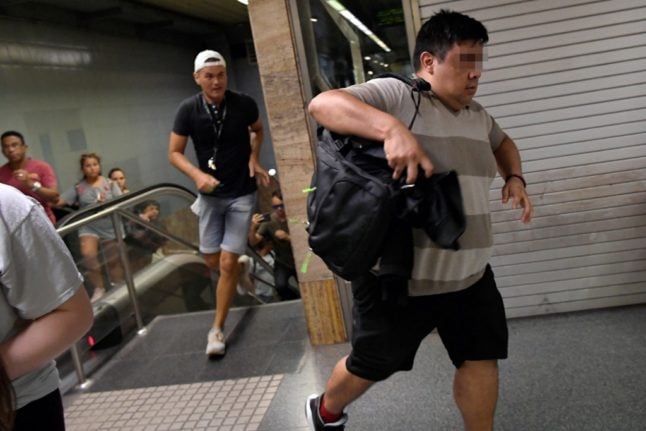Anyone who’s visited or lived in Barcelona knows how important it is to keep an eye on one’s belongings, especially while on public transport or in the city centre.
The metropolis of 5.6 million people is particularly notorious for being the pickpocketing capital of Spain.
Barcelona is in many senses a victim of its own popularity, with a study in July 2022 crowning it the most visited city in Europe this summer.
One of the consequences of this is that Barcelona has become a goldmine for low-level criminals who not only exploit the abundance of distracted tourists exploring the city’s beautiful sights, but also the fact that Spanish law allows them to steal goods worth less than €400 and not face a prison sentence if caught.
The issue was encapsulated in near-scripted style when during a recent TV interview in which a tourist was singing the praises of the Catalan capital, a thief is seen in the background picking up a rucksack and walking away with it.
Ni ensayado.
En Barcelona todo bien y de fondo roban una mochila.pic.twitter.com/f0o0qCYxYy— Edu Galán (@edugalan) August 14, 2022
Between January and June of 2022, 36,386 hurtos took place in Barcelona, according to the Spanish government’s latest Crime Report.
The word hurto in Spanish encompasses different non-violent forms of stealing other people’s property, from pickpocketing to stealing from shops or burglaries.
This equates to 200 reported non-violent robberies a day in Barcelona.
During the first three months of 2022, Catalonia’s Mossos d’Esquadra wished to stress that the 17,000 non-violent robberies committed in Barcelona were “far” from the levels seen in 2019, before the pandemic’s lockdown as well as domestic and travel restrictions which resulted in fewer locals and tourists whom to rob in 2020 and 2021.
They did however acknowledge that the data suggested that there was a return to “normality” vis-a-vis such felonies.
As things stand, the 36,386 non-violent robberies recorded in the first half of 2022 are far lower than the 67,637 that were reported during the first six months of 2019, a record year for crime in the Catalan capital, as hurtos shot up by 40 percent compared to 2018 figures.
But the rise has been even sharper in 2022, with a spike of 79.2 percent in the number of non-violent robberies during the first half of the year. When data for July and August is included in the next report, the increase could be even more dramatic.
Worryingly, the rate of violent crimes has also shot up by 41 percent. There have been reports in the Catalan press and videos shared online showing how organised gangs are now focusing on stealing jewellery and luxury watches from passers-by, violently yanking the items off the victims in broad daylight.
As for burglaries, Barcelona is not the city with the highest rate of break-ins in Spain in 2022, according to Spanish insurance company Estamos Seguros, but it is the city where the value of the items stolen by burglars is on average highest.
Pickpocketing remains the most common form of non-violent robbery in the Catalan capital however, with reoffending criminals unfazed by being apprehended by police.
READ ALSO: How a crime wave in Barcelona is turning residents into citizen crime fighters
A change to Spain’s Criminal Code implemented in July 2022 which will see reoffending thieves who steal goods worth less than €400 stand before a judge may help quash such impunity.
It’s worth noting that non-violent robberies have increased by 51 percent on average across Spain in 2022, but Barcelona once again stands out as the city where pickpocketing and other forms of stealing is rife, higher than in other big cities such as Madrid and Valencia where non-violent theft is also an issue.



 Please whitelist us to continue reading.
Please whitelist us to continue reading.
Barcelona is the only place in Spain I’ve ever felt unsafe or had an issue. Came very close to having my camera grabbed out of my coat pocket. I saw the pickpocket’s hand at the last second and spun around. He ran off. Barcelona is giving Spain a bad reputation.